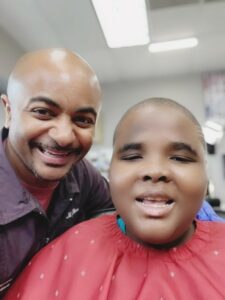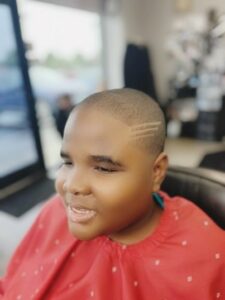Highlighting Community Leaders Supporting the Black Autism Community

Barber, Maurice Bass (left) with Felicia W. Brown’s son (right).
Barbershops and beauty salons hold a special place in the black community, valued for their emotional significance and historical importance as centers of cultural affirmation, personal growth, and knowledge for people of color. Beyond being places for haircuts and beauty treatments, they are vital social spaces where individuals gather to connect, converse, and foster community. Moreover, barbers and stylists often act as mentors and advisors, offering guidance and support that extends beyond physical appearance. They are trusted confidants who provide valuable advice on personal matters, relationships, and career paths.
Barbershops and salons contribute to the empowerment of black individuals by celebrating natural hair textures and embracing cultural diversity through their styling techniques. They play a pivotal role in promoting self-expression and confidence within the community by providing a safe space for individuals to embrace their heritage and express their uniqueness. Additionally, they offer employment opportunities that can lead to entrepreneurship and financial independence for aspiring barbers or stylists within the black community.
These are great spaces for people of color, and it is worth exploring how these cherished establishments can better embrace, understand, and support members of the black autism community. How can these cultural places evolve to accommodate individuals with autism and their families? What steps can be taken to foster an environment of inclusivity and acceptance? Additionally, how can these establishments enhance their efforts to educate the black community about autism and serve as safe spaces for individuals with autism and their families?
These are crucial considerations that are exemplified by Maurice Bass’s successful efforts in this area. Maurice is a licensed barber with Barberz Beyond Measure in Burlington, North Carolina. Below is a Q & A session with Maurice and what he has to say about his charge to lead the way in embracing the autism community.
Felicia Williams Brown: What was your initial introduction to autism, and how has your understanding of it evolved over time?
Maurice Bass: In my ten years working in healthcare at what is now Atrium Health in Charlotte, I had heard the word, but didn’t fully comprehend what it was. It wasn’t until a family member’s child was diagnosed that I understood more about what Autism truly is and the various 3 levels of the spectrum which exist.
FB: What led to your involvement with the autism community as a barber and leader in the community?
MB: As a professional barber at Barberz Beyond Measure in Burlington, NC, I know the barber shop to be a staple in communities of color. With over a decade in this profession, I’ve always wanted to create a welcoming environment for diverse people, including those of various ethnicities, gender identities, and abilities. Since the number of people with an autism diagnosis is increasing, so does the need for barbering services in the population. I want to provide accommodating services that best fit their needs, while also bringing awareness to others.
FB: What led to you gaining the trust of families affected by autism as a reliable source of support?
MB: I was open to learn and be transparent about my own lack of knowledge and ask questions that would best help me serve my clients. With each visit, we built deeper relationships which helped to build trust.
FB: What are the essential attributes and traits that a barbershop in the black community should possess in order to effectively cater to the needs of individuals with autism?
MB: Patience, flexibility, empathy, and a heart for all people.
FB: How can we effectively demonstrate to fellow barbers, clients, and the community the importance of being inclusive towards individuals with autism?
MB: We can start to effectively demonstrate inclusivity through leading by example and being open to sharing the knowledge I’ve gained through my own experiences. Autism is real, and anyone with a diagnosis deserves the same level of treatment, including grooming, as anybody else.
FB: What are your thoughts on how the black community can transition from simply being aware of autism to fully embracing and accepting it in order to provide more comprehensive support for black families throughout the community?
MB: In addition to leading by example, we must educate ourselves and become more involved in the communities where we live. It’s likely that we all have some connection to someone with autism, whether directly or indirectly, so having a variety of avenues of support that can touch people in their daily lives is critical.
FB: What is the number of individuals with autism that you work with, and what strategies do you employ to ensure they have a positive and fulfilling experience?
MB: I currently have five clients that I service regularly that have an autism diagnosis. I allot more time in my schedule for their appointments. I also ensure that the environment is conducive for them (for example, for some clients I will try to limit loud music or television, or too many sounds in the background, and for most, I schedule them during a lower-traffic time at the shop if sensory overstimulation might be an issue). I also use cordless, quiet clippers that help, because some clients can be a bit apprehensive or anxious about the buzzing sound near their ears and head!
FB: Do you think it’s feasible to incorporate adaptive techniques and inclusive concepts from barber school training as a way to broaden support for individuals with autism and special needs? If so, how do you anticipate the response to be?
MB: With my family owning Beyond Measure Barbering Institute of Mebane and Greensboro, NC, this aspect of serving a diverse clientele is already incorporated into our regular training. This is a “must” because a great deal of our training is geared toward the ability to service anyone that comes through the barber shop doors. This not only provides a better experience for the client, but it also increases your earning potential, as a business owner. We have received nothing but positive feedback from our students in response to integrating this level of diversity and inclusion into our curriculum.
FB: What methods can caregivers use to locate you (and barbers like you) and verify your expertise in supporting individuals with autism or special needs?
MB: I can be contacted directly by email at mauricebass@gmail.com, or by mobile at 704.516.9244. For social media outlets, I can be contacted on Facebook under my name, Maurice Bass, and on Instagram through my handle, @mo_tha_barber. I come highly recommended with verifiable references, that I can always supply upon request.
FB: In what ways can the Autism Society of NC assist barbers like yourself, and what are the most effective methods for supplying resources to the families you work with or to clients seeking information about autism?
MB: They could assist us with up-to-date training content (in person or online) and by bringing updated resources, like literature to distribute to the communities and barber shops.
FB: What new message do you wish to convey to the autism and black communities that has not yet been addressed in the previous questions?
MB: I’d like to convey that we are all ONE – one family, one community, one people – and it still takes a village to support everyone with an autism diagnosis and their specific needs, as there is no “one size fits all” solution. We must continue to further educate ourselves to eliminate division. I am thankful for this opportunity.
Remarks by Felicia Williams Brown
 As a mother of a teen with autism, Maurice has been a godsend. Maurice is an exceptional barber who has provided a comforting environment for my family, particularly my autistic son. Witnessing my son’s transformation from being terrified of hair clippers and overwhelmed by sensory stimuli to now confidently getting his hair cut on a regular basis brings tears to my eyes. It’s a remarkable change that I never thought possible. I used to have to cut my son’s hair with scissors because it was the only thing he could tolerate. The support we receive at the barbershop is incredible; my son can freely express himself without drawing unwanted attention. It’s truly heartwarming to see how much progress we’ve made.
As a mother of a teen with autism, Maurice has been a godsend. Maurice is an exceptional barber who has provided a comforting environment for my family, particularly my autistic son. Witnessing my son’s transformation from being terrified of hair clippers and overwhelmed by sensory stimuli to now confidently getting his hair cut on a regular basis brings tears to my eyes. It’s a remarkable change that I never thought possible. I used to have to cut my son’s hair with scissors because it was the only thing he could tolerate. The support we receive at the barbershop is incredible; my son can freely express himself without drawing unwanted attention. It’s truly heartwarming to see how much progress we’ve made.
I was overjoyed to finally discover Maurice, but the search for someone who could truly comprehend and collaborate with us was a challenging journey. I had to reach out to multiple shops and inquire about individuals with expertise in working with people on the autism spectrum. I am truly grateful.
Tips for Barber Shops and Beauty Salons:
- If you are the owner of a barber shop or beauty salon, it’s crucial to recognize the significant influence of inclusivity you can have on the autism community. Embracing diversity and inclusivity will not only improve your business, but it will also help create an unbiased society for everyone.
- If you’re not currently marketing to a diverse community, it’s important to ask yourself how you can move from autism awareness to meaningful steps of inclusion. Consider how you can cultivate an environment of acceptance and set an example of what inclusivity truly means.
- The Autism Society of North Carolina has materials that may be kept in your shop to share with the community. ASNC also has a variety of online resources to expand your knowledge about autism to support your work with individuals and their families. Learn more here:
- If you are already providing services to the autistic community, please think about how you promote your offerings to them specifically, so that they and their families can readily engage with you. How can future autistic clients recognize your expertise in working with them? Autism families are eager for you to broaden your outreach within the community.

